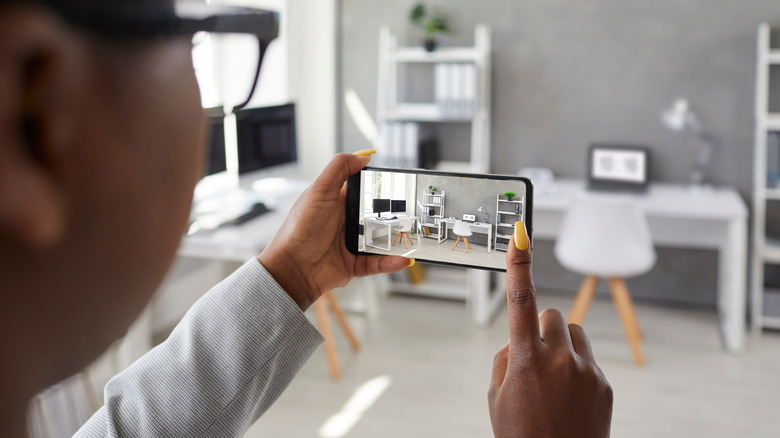The Trick That'll Help You Snag That Favorite Piece Of Furniture You See In The Wild
If you have an eye for design, you've probably found yourself poking around an interesting sofa or table looking for a maker's mark, or perhaps interrogating its owner about how you can find one for yourself. The owner is probably flattered, of course, but even with their help trying to track down furniture that's more than a season or two old can be a challenge. Fortunately, the best way to chase down a particular piece is already in your pocket. Google Lens is designed to do exactly what you're trying to accomplish: track down a piece of furniture you've spotted in the wild, with nothing more than an image to go on. It works like Amazon Lens, which is great for saving money on dupes of high-end furniture, but allows you to search the entire internet rather than just Amazon's stock, so it's also great for competitive shopping.
TikTok maker and décor influencer @taybeepboop gives all the basics in a video announcing her partnership with Google. She explains that snapping a quick photo in the Google app nets you a lot of possible matches, which you can refine by adding text to your search. It's all very neat, so let's look at how to use it, what might go wrong, and how to get things back on track ... and keep you off the floor at parties.
What Lens is, and how it works
Google Lens is an image recognition platform powered by machine learning and is a great tool for using artificial intelligence to elevate your space. Among its many capabilities is the power to break apart an image and identify objects in the photo. Sometimes its source for the most comparable images is online stores: You search for a particular sideboard and most of its results are sellers of similar sideboards. This makes Lens a very effective visual shopping tool. There's no desktop version of Lens, although some of the functionality is built into Chrome's "Search Image with Google" option. The most reliable way to know you'll have Lens at your fingertips on both Android and iOS is to use the Google app itself.
When you see that sideboard, you can open the Google app and click the Lens button. Snap a picture, and you instantly get Lens' best matches. Whether you get an exact match is a function of many factors: how old the piece is, how popular it was, how well you photograph its identifying characteristics, etc. The next-level magic starts when you engage Multisearch, Lens' capacity to combine image and text searches. Swipe up and narrow your search via the "Add to your search" box. You might, for example, type "teak" to eliminate zebrawood impostors. You can use Multisearch to find variations in color, to specify a brand, or to narrow by features like drawers, locks, or tapered legs.
Getting the best results from Google Lens
The thing about machine learning is that it is, and always will be, a work in progress. And Lens occasionally needs a little more work. Typing "teak" might narrow down the options, or it might make all the sideboards completely disappear in favor of teak cabinets, wall units, bars, and bookshelves. This is not unusual — when @taybeepboop added a color to her sofa search, the results no longer matched very precisely. A few strategies can improve your experience here. First, be specific. Text like "teak sideboard" will yield better results than "teak" by itself. And try variations of your wording. Searching "under $1000" might inexplicably give you results like "apartments under $1000 in Towanda PA," so try "[less than symbol] $1000" instead, which seems to refocus Lens on numbers. (You can also change from the image search tab to the shopping tab, which will give you price filters but will restrict your results to online storefronts.)
If you're consistently getting irrelevant results, try tapping on your image and adjusting the area you're searching for. Lens will add a little dot to immediately recognized objects you can search for. Otherwise, you can adjust the highlighted area to eliminate anything else in the picture that might be confusing Lens. In the event that Lens can't find an exact match, it will usually find something comparable ... and often even something you like better.

